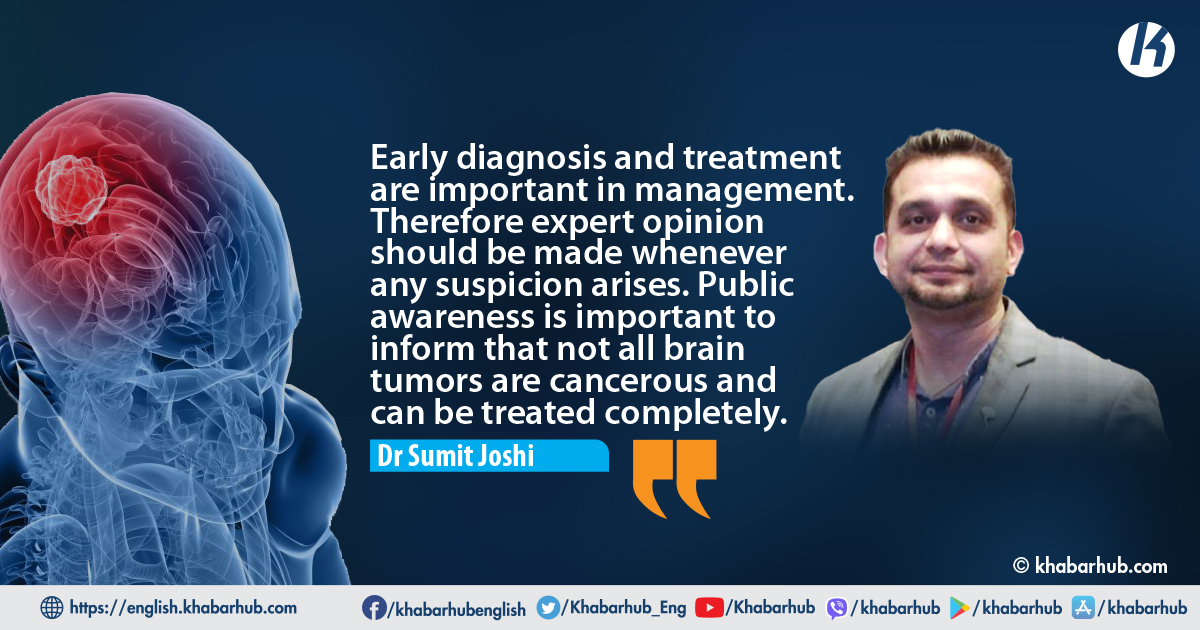Brain tumors, also known as an intracranial tumor, is an abnormal mass of tissue in which cells grow and multiply uncontrollably and is unchecked by the mechanism that controls normal cells.
More than 150 brain tumors have been documented, but the two main groups of brain tumors are termed primary and secondary or metastatic brain tumors.
Primary brain tumors include tumors that originate from the tissues of the brain or the brain’s immediate surroundings.
The primary brain tumors could be categorized as glial (composed of glial cells) or non-glial (developed on or in the structure of the brain, including nerves, blood vessels and glands) and benign or malignant.
Metastatic or secondary brain tumors arise elsewhere in the body (such as breast, and lungs) and migrate to the brain.
Brain tumors are thought to increase when certain genes on the chromosomes of the cells are damaged and no longer function properly.
These genes normally regulate the rate at which cells divide and repair genes that fix the defects of the other genes. Environmental injury factors may then lead to further damage or sometimes environmental injury may be only the cause. It is not clear why some people in the environment develop brain tumors and others do not.
Significantly there is an increase in the number of brain tumors in Nepal as described by a different journal published in Nepal, this is due to the advent of development in the field of specialized care and diagnosis.
There have been multiple large studies relating the use of mobile phones to brain tumors, however, no significant relationship has been established. Exposure to radiation either from disaster, environment, or previous treatment may promote brain tumors.
The symptoms of the brain tumors may depend on the location of the brain tumor, they usually present with headache, seizures, personality change, cognitive changes, dizziness, weakness or paralysis on one side of the body, vision changes, hearing loss, facial numbness, tingling, vomiting, confusion, and disorientation.
Brain tumors are usually diagnosed with computed tomography (CT scan), Magnetic Resonance Imaging (MRI), and Magnetic Resonance Spectroscopy (MRS) which can examine the tumor’s chemical profile.
Positron Emission Tomography (PET scan) can help detect recurring brain tumors. Pathological diagnoses are the mainstay of the diagnosis which includes histological and molecular diagnoses.
Sometimes the diagnosis of the tumor is also stabilized through a brain biopsy. Brain tumors whether primary or secondary usually are treated with surgery, radiation, or chemotherapy alone or in various combinations.
The latest development inclusively has improved patients’ safety, management and survival. Early diagnosis and treatment are very important in the management, therefore expert opinion should be made whenever any suspicion arises.
What treatment to use is based on a case-by-case basis and depends on several factors. There are risks and side effects associated with each type of therapy.
Significantly there is an increase in the number of brain tumors in Nepal as described by a different journal published in Nepal, this is due to the advent of development in the field of specialized care and diagnosis.
Radiological diagnosis is possible in every state of Nepal nowadays, specialized neurosurgical and onco care are also possible in many centers of Nepal.
Many centers in Nepal are now equipped with the latest neurosurgical technology like neuronavigation, stereotactic system, neuromonitors, microscopes, and intraoperative CT scan /MRI, besides histological diagnosis molecular diagnoses are also available in Nepal nowadays.
Oncological care has also improved and developed in Nepal which is also facilitated by the government in the management of these patients.
The latest development inclusively has improved patients’ safety, management and survival. Early diagnosis and treatment are very important in the management, therefore expert opinion should be made whenever any suspicion arises.
There should be an increase in awareness that not all brain tumors are cancerous and can be treated completely.
(Dr. Sumit Joshi, Consultant neurosurgeon, Department of Neurosciences, Nepal Mediciti Hospital)








Comment